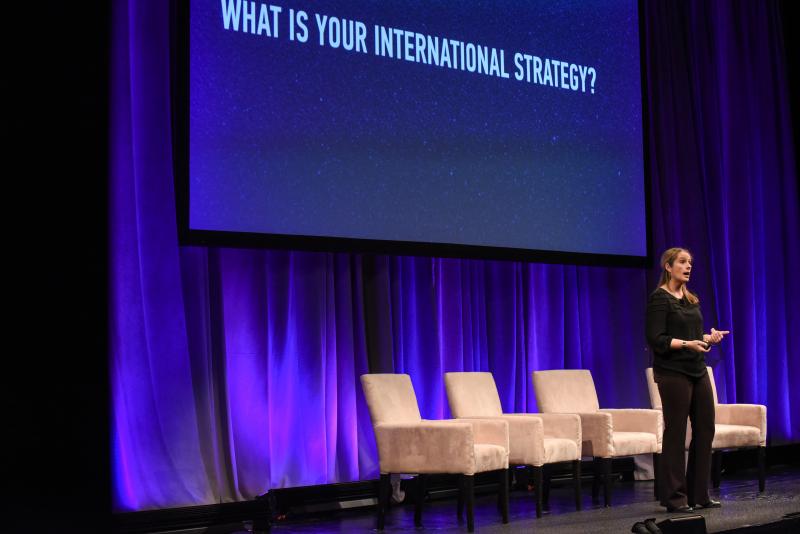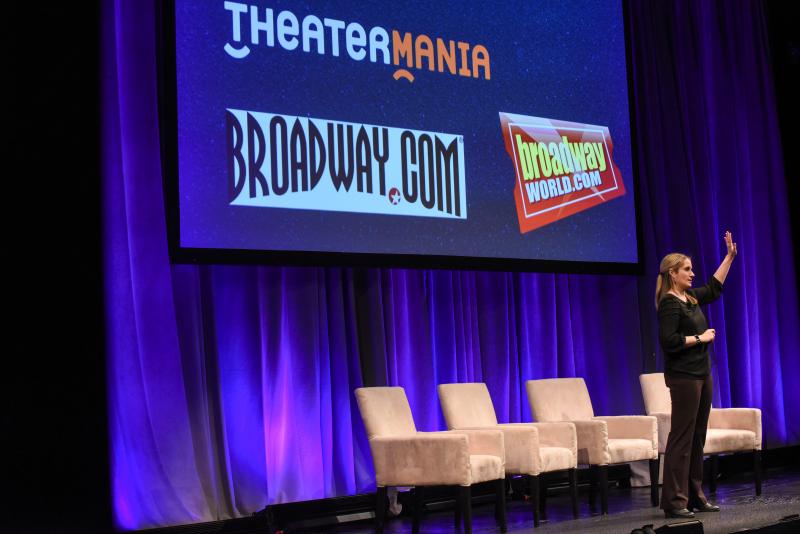Industry Interview: Situation's Lisa Cecchini on the Broadway Trends for International Audiences

On Tuesday, November 27th, New World Stages hosted the first-ever TRENDING BROADWAY. It was a day spent fully immersed in conversation about key trends across culture, technology, and media that are shaping the future of the Broadway business.
The inaugural event was presented by The Shubert Organization and digital agency, Situation. Through the power of their community, the duo created an inspiring lineup that zeroed in on issues impacting our industry today and in the years to come.
Included in the line-up was a talk from Situation's Lisa Cecchini, who explained how to market to international audiences in our new reality. Below, she tells us more about the trends found from the study, and how they will continue to shape the way Broadway communicates with international markets.
Today's interview is prompted by my love of the talk that you gave (at Trending Broadway 2018) on data and specifically a recent study done by Situation with the Broadway League. Can you give us a little summary of that?
Sure, the whole event was focusing on a handful of trends seen in the Broadway space. My talk specifically was focused on international tourism. I broke it into three trends that we see in the international space....
Which was trend #1?
The first was generally based on data provided by the New York City Tourism Board that shows the trend is continuing to go up. There was a question with some of the current economic situations in some of the foreign markets, as well as some of the upheaval with Brexit and their effect. There have been some policies that America put into place concerning certain countries not being able to come into the United States. Our question was whether international tourism to New York City might have slowed down in 2017 and 2018. The data is showing that it is not. The percentage growth year over year continues to be really strong, and the numbers have doubled in a little over ten years.
That's really huge growth...
The numbers continue to be really, really strong. Not only that but the majority of the markets that come into New York are also prime Broadway buying markets according to sales data.
There's a nice cross-over there. There's a nice pattern that we should always be taking advantage of.
The second part of the talk was focused on a loose conversation about do we know what do these foreign tourists see before they're coming into market? If they're researching about what to do in New York City? What are they learning? For a long time, when I sat in ad meetings, I'd hear people say things like, "A foreign tourist will buy one show before they arrive in market and one show when they get into market." Or "Foreign tourists only buy tickets at the TKTS booth, because that's all the guidebooks say." There are all of these "isms" that are out there that we will refer to, but they're not necessarily grounded in data... They're from the gut.
 How do you get inside the minds of tourists?
How do you get inside the minds of tourists?
What I wanted to do was literally search on Google "What to do in New York City?" in multiple languages, on their respective Google domains, and to see what the articles are saying about what to do in New York.
The theme that we're seeing is that going to a Broadway show is on all these articles - whether I'm reading these articles in French (using Google Translate, of course) - or reading them in Portuguese, orGerman. They're all saying, "You should go see a Broadway show!" The information on how to do that or what to pick or how much they cost is not consistent.
What's the quality of that information like?
It seems like there is a lot of inaccurate information out there, but, the international tourist that's researching things to do, wouldn't necessarily be any different than what we know in American culture.
They see this information about, "You should go see a Broadway show, it should be a bucket list item." If they see potentially incorrect or incomplete information, that could discourage people from purchasing before they arrive, especially if it seems intimidating.
The third part of this international conversation was with the Broadway League study that they allowed me to present some data from. What they wanted to do was to see if there was advertising media in these markets - would we be able to raise awareness, and drive advance purchasing for these tourists before they arrived in market?
This campaign was executed in three markets: Germany, Australia, and Canada. They were selected for varying reasons, because of the language barrier for Germany, because Australia is so far away, and then Canada. That's, of course one, of the 'lowest hanging fruit markets,' because most of their speakers are English speaking, and their proximity is closest of any of the major tourist markets to New York City.
Were the ads for specific shows or for Broadway in general?
We ran media that was show neutral, and it just focused on how you should purchase before you arrive in market, because you can get great tickets to great shows and you can jump those queues. We were using language and vernaculars that was appropriate for those tourist markets.
Then we tracked sales working with all the theaters. They allowed us to track sales across whatever show people were buying. We drove them to the broadway.org website, but once there, people were driven to whatever their respective ticketing engine, was and we were able to track sales to that.
The performance showed that looking at year over year website traffic - significant increases from those three markets. More importantly, and what we know everyone was more focused on is the dollars that we could track. We tracked about $600,000 in advance ticket sales in those three markets during the test period for this media running.

Was that consistently split across the markets?
There were varying degrees of success. The English-speaking countries saw much, much better ROI, which we have assumed is probably because of the language barrier in the German market. Of course, when you purchase on Telecharge or Ticketmaster, or elsewhere, there is no translated experience. If you're using Google Translate or something like that, some of the pertinent information is in an image instead of text, and so it can't be translated, etc. Most likely, Germany could have done better had it not been for the barrier in the language translation. In general, we were just really pleased with the numbers. The other part of this is that we've seen that it is possible with the right methods to drive advance purchasing before in-market arrival.
So how would you sum up the takeaway?
The numbers are up for the volume of people in market, and they are markets that buy tickets. Looking at how people research what to do in New York City, it seems like they're getting the information that Broadway is a must do. But the information about how to do that or what to do is not great.
It looks like if we put the right message from a media perspective in front of potential inbound New York City tourist before arrival in market, we can get them to convert before they come in market.
The takeaway with the whole thing was that I just wanted to hopefully encourage everyone to have a conversation about what their international strategy should be. It was not to say that all shows should be executing a paid, internationally-targeted media buy. It probably makes sense for some shows, and it doesn't make sense for other shows.
The reality is all our brands are international, whether you realize it or not. All the major theater sites, they certainly get international traffic to those sites, so our banner ads and our content are certainly being put in front of international audiences. Of course, all our clients have social channels, and those social channels are followed by tons of international people. They may or may not come to see your show, but they can certainly share content and influence people who might see your show.
Do you think they should be jumping into buying to jumping into talking about it?
At least have a conversation about it? Should you be posting some geo-targeted posts to people in a particular market speaking in their language? It would be such a little expense but could really pay dividends in the sharing of that content. Is that worth doing? Is that worth your time, depending on your specific numbers?
Really, again, I'm just encouraging everyone to have a conversation about what the international strategy should be for their individual shows.

Knowing that you look at data all day long, were there parts throughout the process that surprised you? Or did it confirm theories in other data you're already looking at?
Some of it is stuff that I'm just aware of because I'm in the weeds all the time. I would say the exercise of Googling in different languages, and I had never done that before. I wasn't aware, and I was surprised at how poor the information was that was out there. They would talk about "Go see a Broadway Show," but it wouldn't help you - on how to get tickets or what's the best way to get tickets. I thought I would see more articles that said, "Go to the booth that's in Times Square and just purchase your tickets there." I really didn't find that. I was surprised because that was an adage that I had in my head that, 'Oh, this is what people see.' I didn't personally find that very often as I was researching in different languages.
Is that something you are now pushing as an agency to do more international work? I know every show is different but...
I want to put the money where my mouth is, and I don't want to talk the talk and not walk the walk. It's a conversation that I want to be having more and more. Of course, it is not the same for every show. We work on global brands like Wicked, and then we work with brand new musicals that are not based on existing materials that are just opening this season.
Those two shows - a 15-year musical versus a brand-new show this season not based on source material - are in very different places. And the source material part, in particular, is a pretty substantial part of the equation, probably even more so than the length of a Broadway run. We also work on Pretty Woman. Pretty Woman has huge potential for being an international show, just since the film has been translated into so many languages and is beloved across cultures. There is an enormous opportunity there, even though the show is young.
A lot of times shows don't think about having a heavy tourist strategy when they're only six months into their run. It's a conversation that we shouldn't be assuming just based on longevity in market, and they should or should not be having. Let's really look and dive into each show individually and talk about whether they should have an international strategy.
For a show like Pretty Woman, do you think they would benefit from having content on or off of their site in different languages?
Yeah, I think they would be based on what we've learned to date about the brand - and how people have responded to content that we've put out in the market.
Anastasia is another great example. The very first piece of content that we put out was about two weeks before tickets went on sale, two Septembers ago now. We were particularly surprised by the response from international audiences. Pretty Woman was a little bit more predictable since it has had an extensive life on cable television in the US and most likely abroad as well.
Do you try and find locals to write the content as opposed to bilingual Americans?
Google has provided some translation services for us, and it's humans doing the work, not Google translate. You have to make sure that those nuances are there. In the study, for example, when we were using the "jump the queue" in the Ad created for the Australian audiences instead of "jump the line," we were using the correct vernacular, and I think that goes a long way. It is unmeasurable how much of an impact it makes, but gut-wise, it just seems like that is going to look so much more authentic when you're using the correct vernacular.
Speaking of "gut-wise" how is the evolution going with producers in the industry as a whole? What percentage is still "gut" and what percentage is data?
Oh gosh.
Is it moving in the direction of people accepting data more or still going back to the gut?
I think people are absolutely accepting the data more. It continues to be such an up and down opportunity. There's more data all the time, but then there's still constant problems of the industry of, 'Okay, well, we've got data based on online ticket buyers, but I don't have data about the TKTS booth buyers, box office buyers. And then there are multiple channels, so I only have the online sales from my official channels, but as soon as they buy through some of the secondary markets or brokers, I start to lose them.
You continue to have such a fragmentation. If I'm looking at information about ticket buyers, I'm only looking in the silo of online ticket buyers through our official channels, and that only represents a fraction of the overall buyers. It's just a question of how much is that representative of the bodies that are in the theater? Or is it not representative, because the types of people who buy in alternate channels are very different people? That's just a reality that is not going to change any time soon in our industry.
The other thing that majorly impacted - I mean, this year has been the most interesting year probably in my 13 years of working at Situation because of how media and data have changed to solve the privacy issues we've had. ITP - Intelligent Tracking Prevention 1.0 started a little over a year ago now. Then it was Cambridge Analytica, and then GDPR goes into effect, and it's ITP 2.0. It's one thing after another after another. Consumers are becoming more aware of what's being tracked, so they're not allowing us to track as much. Then other technology providers have stepped in and decided, 'Well, I'm not going to allow you, marketer, to track as much.'
In some ways, we're losing some of what we could track, or we're losing some of the targeting we did have, due to some of those changes as well. It's a constantly evolving landscape. Again, I used to be able to identify the age of my online buyers' 60 percent of the time and now I can only do it 40 percent of the time. Is that 40 percent still representative of the whole? Or is that a skewed sample based on the types of people that don't use Safari and that don't control their cookie settings? It's tough to say.
I think, for the most part, that clients are more open than ever trying to ground their strategies in whatever data that we have, even if it's just a segment of the population.

How do you avoid overwhelming them with data? We hear all the time we can track a million things, but of the million only 20 of them are actionable and only 3 of them you should have done, because it's either not representative or you can screw as many things up as you can improve?
As someone who does the pulling of the data and the analyzing, I'm usually looking to the clients or in an agency structure, client services as the one who's speaking closest to the client.
It's almost like the science experiments that you did when you were a kid, where you start with the research objective, and then you have a hypothesis, and you have a methodology. It's that same thought process.
We have to start with a very specific question that we want to answer. For example, we had a star in the show for a certain period. How did our buyer demographics change from before they were in the show when they were in the show, and after they left the show? Did we immediately go back to our original demo or did we sustain some of the new audiences we attracted with the star casting?
What sort of new trends or tools are you looking forward to for 2019?
We're rolling out some new dashboards for the agency that I'm excited about. They dive into macro-level data pulled in from all the primary sources. Web Analytics, Media, all the social channels, YouTube. Using all those system APIs, we'll get a much quicker overview on the fly of what's happening in all those places. A kind of phase 2 part of that project has better benchmarks in real time.
The big thing we always hear from clients is that they want to know how they're doing in comparison to other shows. As an agency, we need to supply that information, but without violating client confidentiality in any way.
The dashboards will allow us to tap into the real-time data for that client, as well as aggregated data across all our clients again in real time, that will give them a better sense of whether we up when everyone else is down? We can get that number from the grosses that are publicly presented, but this will give them another layer to that puzzle about how they are comparing to everyone else regarding social, web analytics, YouTube video views, and media.
One of the main trends you'll see for next year is data and better use of that data. That's something I think we can all get behind!

Videos
